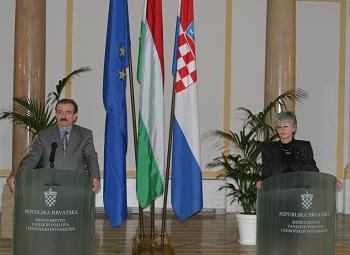- Published: 30.10.2007.
6th session of Mixed Committee for Co-operation between Croatian and Hungarian governments
On 30 October 2007, the Mixed Committee for Co-operation between the Government of the Republic of Croatia and the Government of the Republic of Hungary held its 6th session in Zagreb
Both sides confirmed the exceptionally good relations between the two countries and pointed out Croatia’s significant progress in acceding to the Euro-Atlantic integration, in which Hungary has been offering comprehensive political and expert assistance. The two sides stressed the importance of the achieved solution on keeping the existing border regime, which will allow the Croatian citizens residing in Croatia to cross the Hungarian border with an ID card only even after Hungary enters the Schengen system.
It was concluded that the two governments’ joint sessions have a great political and economic importance, and contribute to the affirmation of the regional, as well as the European policy, with both sides supporting their further annual holding.
The session confirmed the importance of cross-border co-operation in the minority rights protection as a proven model for a wider region, pointing out especially the importance of the 2007-2013 Croatia-Hungary Cross-Border Co-operation Program. The session also arranged the intensification of the co-operation within the “Pécs – the European Capital of Culture 2010” project and the protection of natural wealth along the border for the purposes of setting up a border biosphere reservation in accordance with the UNESCO categories.
The state secretaries emphasized the importance of continuing the co-operation in economy, energy and infrastructure projects, commending the progress in developing the road infrastructure of common interest. The two sides also encouraged the further strengthening of the overall relations within the context of the relations with the EU and NATO, in economy, cross-border co-operation, environmental protection, water management, tourism, co-operation in minority issues, science, education, culture, internal affairs, justice, local self-government co-operation, mine action, protection and rescue, health, construction, agriculture, IT and e-business, on other concrete projects.
The session was preceded by the political consultations between State Secretary Biščevića and State Secretary Fekszi, which focused on the current bilateral topics and exchanged opinions about the situation in the region.



